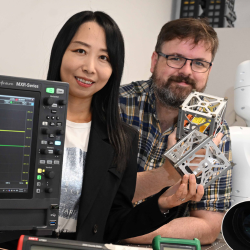-
Study
-
Undergraduate
- Search for a Course
- Undergraduate Open Day & Events
- Application Guides
- Northumbria University UCAS Exhibitions
- Foundation Years
- Undergraduate Fees & Funding
- School & College Outreach
- Continuing Professional Development
-
Postgraduate
- Postgraduate Study Degree
- Postgraduate Research Degrees
- Postgraduate Open Days and Events
- Postgraduate Fees & Funding
- Flexible Learning
- Thinking about a Masters?
- Continuing Professional Development
- Change Direction
-
Student Life
- The Hub - Student Blog
- Accommodation
- Life in Newcastle
- Support for Students
- Careers
- Information for Parents
- Students' Union
- Northumbria Sport
- Be Part of It
-
-
International
International
Northumbria’s global footprint touches every continent across the world, through our global partnerships across 17 institutions in 10 countries, to our 277,000 strong alumni community and 150 recruitment partners – we prepare our students for the challenges of tomorrow. Discover more about how to join Northumbria’s global family or our partnerships.
View our Global Footprint-
Applying to Northumbria
- European Union
- Our London Campus
- Northumbria Pathway
- International Events
- Entry Requirements and Country Representatives
- Regional Offices
-
Northumbria Language Centre
- Faculty Requirements
- Acceptable English Requirements
- Pre-sessional English Language and Study Skills
- Academic Language Skills Programmes (ALS)
-
International Fees, Funding & Scholarships
- International Undergraduate Fees
- International Undergraduate Funding
- International Masters Fees
- International Masters Funding
- International Postgraduate Research Fees
- International Postgraduate Research Funding
- International Money Matters
-
Life at Northumbria
- International student support
- Careers
-
International Mobility
- Current Northumbria Students
- Incoming Exchange Students
-
-
Business
Business
The world is changing faster than ever before. The future is there to be won by organisations who find ways to turn today's possibilities into tomorrows competitive edge. In a connected world, collaboration can be the key to success.
More on our Business Services -
Research
Research
Northumbria is a research-rich, business-focused, professional university with a global reputation for academic quality. We conduct ground-breaking research that is responsive to the science & technology, health & well being, economic and social and arts & cultural needs for the communities
Discover more about our Research -
About Us
-
About Northumbria
- Our Strategy
- Our Staff
- Place and Partnerships
- Student Profiles
- Alumni Profiles
- Leadership & Governance
- Academic Departments
- University Services
- History of Northumbria
- Contact us
- Online Shop
-
-
Alumni
Alumni
Northumbria University is renowned for the calibre of its business-ready graduates. Our alumni network has over 244,000 graduates based in 178 countries worldwide in a range of sectors, our alumni are making a real impact on the world.
Our Alumni - Work For Us
What will I learn on this module?
You will have the opportunity to analyse and examine digital security and forensic case studies using the latest industry specialist utilities and tools, giving invaluable hands-on practical use. Learning and teaching will take place through a variety of mechanisms. Topics will be introduced in lectures and discussed through seminar activities and guided learning activities. The theoretical material on digital security and forensics will be re-enforced through the critical analysis and discussion of case studies in seminar sessions as well as sessions on the use of security and digital forensics tools in the analysis of chosen case studies in lab-based practical sessions.
How will I learn on this module?
The module will be taught as a combination of lectures and workshops. The lectures will cover the theoretical knowledge required for you to complete various guided exercises provided during the workshop sessions.
How will I be supported academically on this module?
You will be guided through and provided feedback on exercises during the timetabled sessions as well as attending a series of lectures and seminars covering core teaching topics. In addition, the eLP (electronic learning portal) blackboard will be used to provide extensive supporting material which can be accessed outside of the teaching schedule.
What will I be expected to read on this module?
All modules at Northumbria include a range of reading materials that students are expected to engage with. Online reading lists (provided after enrolment) give you access to your reading material for your modules. The Library works in partnership with your module tutors to ensure you have access to the material that you need.
What will I be expected to achieve?
Knowledge & Understanding:
1. Communicate and present written investigative findings.
2. Evaluate how the core concepts, knowledge and practice of digital security and forensics have developed through research.
3. Analyse and evaluate the professional requirements and to critically discuss the challenges facing the security and digital forensics practitioner.
Intellectual / Professional skills & abilities:
4. Identify and evaluate findings obtained from digital security or forensics investigations and apply appropriate legal and procedural principles to that evidence.
Personal Values Attributes (Global / Cultural awareness, Ethics, Curiosity) (PVA):
5. Communicate and present written investigative findings in such ways that they meet the expected standards.
How will I be assessed?
The assessment requires students to investigate a mock case study culminating in the production of a formal written report.
Formative feedback opurityies opportunities will take place throughout the semester. Module learning objectives will be tested via a problem-based case study investigation. All MLOs will be assessed.
Summative feedback will be provided 20 working days after the submission.
Pre-requisite(s)
Introduction to Computer Security and Forensics
20 Credits
Co-requisite(s)
None
Module abstract
You will have the opportunity to analyse and examine digital security and forensics case studies using the latest industry specialist utilities and tools, giving invaluable hands-on practical use. You will be guided through and provided feedback on exercises during the timetabled sessions as well as attending a series of lectures and seminars covering core teaching topics. You will be assessed via a written formal report, requiring you to undertake research in a prominent area of digital security or forensics and associated technology.
Course info
UCAS Code GF44
Credits 20
Level of Study Undergraduate
Mode of Study 3 years Full Time or 4 years with a placement (sandwich)/study abroad
Department Computer and Information Sciences
Location City Campus, Northumbria University
City Newcastle
All information is accurate at the time of sharing.
Full time Courses are primarily delivered via on-campus face to face learning but could include elements of online learning. Most courses run as planned and as promoted on our website and via our marketing materials, but if there are any substantial changes (as determined by the Competition and Markets Authority) to a course or there is the potential that course may be withdrawn, we will notify all affected applicants as soon as possible with advice and guidance regarding their options. It is also important to be aware that optional modules listed on course pages may be subject to change depending on uptake numbers each year.
Contact time is subject to increase or decrease in line with possible restrictions imposed by the government or the University in the interest of maintaining the health and safety and wellbeing of students, staff, and visitors if this is deemed necessary in future.
Useful Links
Find out about our distinctive approach at
www.northumbria.ac.uk/exp
Admissions Terms and Conditions
northumbria.ac.uk/terms
Fees and Funding
northumbria.ac.uk/fees
Admissions Policy
northumbria.ac.uk/adpolicy
Admissions Complaints Policy
northumbria.ac.uk/complaints














